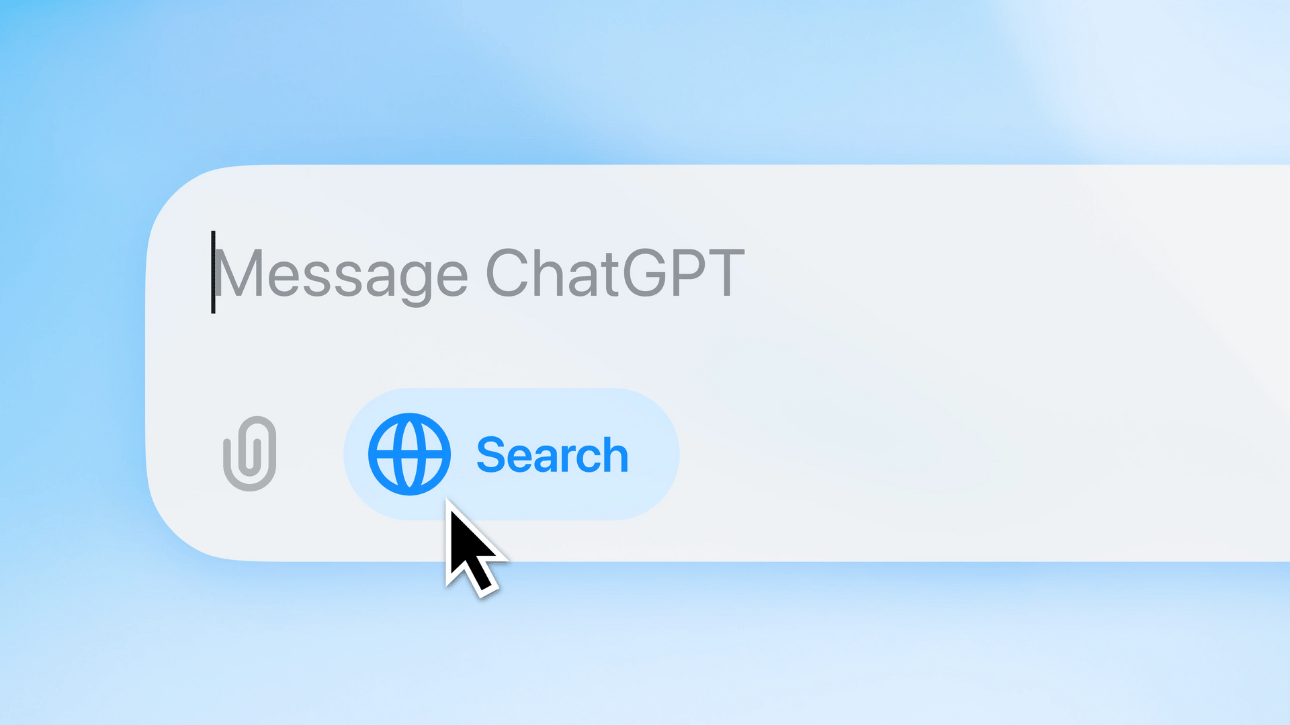- The Logical Box
- Posts
- ChatGPT's new search feature redefines information retrieval, merging conversational AI with real-time web data
ChatGPT's new search feature redefines information retrieval, merging conversational AI with real-time web data
PLUS: Google introduces AI-powered writing features for Chromebooks

Hello, AI Explorer! Welcome to The Logical Box
OpenAI has introduced a powerful web search feature for ChatGPT, enabling users to receive timely answers with links to relevant sources, effectively combining the benefits of natural language interaction with current information from the internet.
Let’s get into it…
Let’s Take a Peek Inside the Box for Today’s Issue:
ChatGPT's new search feature redefines information retrieval, merging conversational AI with real-time web data
Meta's FAIR team launches open-source robotics tools for touch perception and human-robot interaction
Google introduces AI-powered writing features for Chromebooks
Noma Security emerges with tools to tackle AI application vulnerabilities
Buddy.ai offers AI-powered English lessons for children through interactive voice-based games
AI Tip of the Week: Enhance Decision-Making with Tableau's AI-Driven Analytics
Read time: 6 minutes

Image Source: OpenAI
Think Inside the Box:
OpenAI has introduced a powerful web search feature for ChatGPT, enabling users to receive timely answers with links to relevant sources, effectively combining the benefits of natural language interaction with current information from the internet.
Unpacking the Logic:
ChatGPT now autonomously decides when to search the web based on user queries, with a manual search option available.
The feature is accessible on chatgpt.com and mobile apps, initially for ChatGPT Plus, Team, and SearchGPT waitlist users.
Responses include source links, allowing users to explore original content through a sidebar.
The search model is a fine-tuned version of GPT-4o, leveraging third-party search providers and partner content.
OpenAI collaborated with numerous news industry partners to ensure high-quality content integration.
The Logical Impact:
Logically speaking, this new search capability could significantly impact how users interact with information online, raising the question: How might this shift influence traditional Google search dynamics in the future?

Image source: Meta
Think Inside the Box:
Meta's Fundamental AI Research (FAIR) team has released several open-source innovations in robotics, focusing on touch perception, dexterity, and human-robot collaboration, aiming to advance embodied AI and its applications in various industries.
Unpacking the Logic:
Meta Sparsh, a general-purpose touch representation, works across multiple sensors and tasks, enhancing AI's ability to perceive through touch.
Meta Digit 360, a tactile fingertip sensor with human-level multimodal sensing capabilities, will be manufactured and distributed by GelSight Inc.
Meta Digit Plexus, a standardized platform, integrates various tactile sensors onto a single robot hand, facilitating advanced dexterity research.
PARTNR benchmark introduces a framework for evaluating planning and reasoning in human-robot collaboration scenarios.
Meta is partnering with GelSight Inc and Wonik Robotics to commercialize these innovations and make them accessible to researchers.
The Logical Impact:
From a practical standpoint, these open-source robotics advancements could significantly accelerate research and development in embodied AI. This raises an important question for the tech industry: How might Meta's push for open-source robotics innovations challenge or complement the existing AI research landscape dominated by companies like Google and OpenAI?

Image source: Ideogram / Andrew Keener
Think Inside the Box:
Google has launched new AI-powered writing tools for Chromebooks, designed to enhance productivity and creativity for students and other users, with features like Help me write and text expansion.
Unpacking the Logic:
The "Help me write" feature assists users in starting or expanding their writing by generating text based on prompts.
Text expansion allows users to quickly insert commonly used phrases or sentences by typing shortcuts.
These AI features are currently available on select Chromebook devices running ChromeOS version 117 or later.
Users can access these tools through the ChromeOS settings menu under "Experimental AI features."
The features work across various apps and websites, including Google Docs, Gmail, and social media platforms.
The Logical Impact:
From a practical standpoint, these AI-powered writing tools could significantly impact how students and professionals approach writing tasks on Chromebooks. This raises an important question: How might the integration of AI writing assistants in everyday devices like Chromebooks reshape educational and professional writing practices?

Image source: Ideogram / Andrew Keener
Think Inside the Box:
LinkedIn is introducing an opt-in program allowing users to contribute their account data for AI training, raising questions about data privacy and the ethical use of personal information in AI development. You will be able to opt out, but LinkedIn stated this does not affect training that already has occurred.
Unpacking the Logic:
Many companies adopting AI are concerned about increased cybersecurity vulnerabilities.
Noma's platform scans for sensitive data in model training datasets, such as personally identifiable information.
The startup aims to consolidate AI app security functions in a single dashboard for both cloud-based and self-hosted environments.
The company recently closed a $25 million Series A funding round, bringing its total capital raised to $32 million.
The Logical Impact:
From a practical standpoint, Noma's approach to AI security could significantly impact how organizations manage risks associated with AI adoption. This raises an important question: How might comprehensive AI security solutions like Noma's influence the pace and scale of AI integration across various industries?
AI TRAINING
Buddy.ai offers AI-powered English lessons for children through interactive voice-based games

Image source: Buddy AI
Think Inside the Box:
Buddy.ai is an online platform that uses artificial intelligence to teach English to children through personalized, voice-based learning games and lessons, designed to cater to various learning styles and developmental stages.
Unpacking the Logic:
The platform utilizes advanced voice recognition and AI technology to interact with children.
Lessons are ad-free and game-based, encouraging longer learning sessions.
Buddy adapts to different learning styles: Visual, Auditory, and Kinaesthetic.
Three programs are offered, aligned with the U.S. educational system, covering foundational skills, literacy enhancement, and skill reinforcement.
The AI engages in small talk to build rapport before introducing new concepts using multimedia elements.
Children practice through interactive exercises and conversational games, demonstrating understanding in context.
The Logical Impact:
From a practical standpoint, Buddy.ai's approach to language learning could significantly impact how children acquire English skills in non-native speaking environments. This raises an important question: How might AI-driven, personalized language learning tools reshape traditional educational methods and accessibility to language education for children globally?
AI TIP OF THE WEEK
AI TIP OF THE WEEK
Enhance Decision-Making with Tableau's AI-Driven Analytics
Use Case:
In dynamic sectors like sales, finance, and operations, leaders require immediate data insights to make informed decisions. Accessing these insights without a dedicated data team is achievable with the right AI tools.
Tool:
Tableau with AI-Enhanced Visual Analytics
Tableau uses AI to analyze data from multiple sources in real time. With tools like Tableau GPT and Tableau Pulse, it streamlines analysis and delivers personalized insights, allowing users to interact with data in natural language to quickly uncover trends and forecast outcomes.
How to Get Started:
Connect Your Data Sources: Integrate Tableau with your CRM, financial systems, or other relevant data sources.
Explore AI Features: Utilize Tableau GPT for data analysis and Tableau Pulse for personalized insights.
Engage with Natural Language Queries: Use natural language to ask questions about your data and receive instant, AI-driven responses.
Quick Win:
Implementing Tableau's AI features allows you to access real-time insights, enabling swift, data-driven decisions without the need for extensive data analysis expertise.
By leveraging Tableau's AI-driven analytics, you can transform your data into actionable insights, enhancing your decision-making process and operational efficiency.
Please share The Logical Box link if you know anyone else who would enjoy!